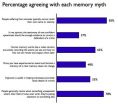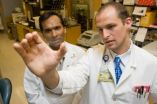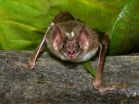(Press-News.org) CHAMPAIGN, Ill. — A new survey reveals that many people in the U.S. – in some cases a substantial majority – think that memory is more powerful, objective and reliable than it actually is. Their ideas are at odds with decades of scientific research.
The results of the survey and a comparison to expert opinion appear in a paper in the journal PLoS ONE.
(Before reading further, test your own ideas about memory.)
"This is the first large-scale, nationally representative survey of the U.S. population to measure intuitive beliefs about how memory works," said University of Illinois psychology professor Daniel Simons, who led the study with Union College psychology professor Christopher Chabris. Simons and Chabris conducted the survey during research for their book, "The Invisible Gorilla," which explores commonly held (and often incorrect) beliefs about memory and perception.
"Our book highlights ways in which our intuitions about the mind are mistaken," Simons said. "And one of the most compelling examples comes from beliefs about memory: People tend to place greater faith in the accuracy, completeness and vividness of their memories than they probably should."
The telephone survey, carried out by the opinion research company SurveyUSA, asked 1,500 respondents whether they agreed or disagreed with a series of statements about memory.
Nearly two-thirds of respondents likened human memory to a video camera that records information precisely for later review. Almost half believed that once experiences are encoded in memory, those memories do not change. Nearly 40 percent felt that the testimony of a single confident eyewitness should be enough evidence to convict someone of a crime.
These and other beliefs about memory diverge from the views of cognitive psychologists with many years of experience studying how memory works, the researchers report. While studies have shown, for example, that confident eyewitnesses are accurate more often than eyewitnesses who lack confidence, Chabris said, "even confident witnesses are wrong about 30 percent of the time."
Many studies have demonstrated the ways in which memory can be unreliable and even manipulated, Simons said.
"We've known since the 1930s that memories can become distorted in systematic ways," he said. "We've known since the 1980s that even memory for vivid, very meaningful personal events can change over time. For example, (Cornell University psychology professor) Ulric Neisser showed that personal memories for the Challenger space shuttle explosion changed over time, and (University of California professor) Elizabeth Loftus and her colleagues have managed to introduce entirely false memories that people believe and trust as if they had really happened."
"The fallibility of memory is well established in the scientific literature, but mistaken intuitions about memory persist," Chabris said. "The extent of these misbeliefs helps explain why so many people assume that politicians who may simply be remembering things wrong must be deliberately lying."
The new findings also have important implications for proceedings in legal cases, the researchers said.
"Our memories can change even if we don't realize they have changed," Simons said. "That means that if a defendant can't remember something, a jury might assume the person is lying. And misremembering one detail can impugn their credibility for other testimony, when it might just reflect the normal fallibility of memory."
INFORMATION:
Simons is an affiliate of the Beckman Institute at Illinois.
Editor's notes: To reach Daniel Simons, call 217-898-8003; email dsimons@illinois.edu. To reach Christopher Chabris, call 617-823-6173; email chabris@gmail.com.
The paper, "What People Believe About How Memory Works: A Representative Survey of the U.S. Population," is available online or from the U. of I. News Bureau.
National survey reveals widespread mistaken beliefs about memory
2011-08-04
ELSE PRESS RELEASES FROM THIS DATE:
Lifestyles of the old and healthy defy expectations
2011-08-04
VIDEO:
People who live to 95 or older are no more virtuous than the rest of us in terms of their diet, exercise routine or smoking and drinking habits, according to...
Click here for more information.
August 3, 2011 — (Bronx, NY) — People who live to 95 or older are no more virtuous than the rest of us in terms of their diet, exercise routine or smoking and drinking habits, according to researchers at Albert Einstein College of Medicine of Yeshiva University.
Their findings, ...
Mayo Clinic finds new bacterium causing tick-borne illness ehrlichiosis in Wis., Minn.
2011-08-04
ROCHESTER, Minn. -- A new tick-borne bacterium infecting humans with ehrlichiosis has been discovered in Wisconsin and Minnesota. It was identified as a new strain of bacteria through DNA testing conducted at Mayo Clinic. The findings appear in the Aug. 4 edition of the New England Journal of Medicine.
Doctors at Mayo Clinic, the Centers for Disease Control and Prevention (CDC), the University of Minnesota, the University of Wisconsin, and state and local health departments say the new species from the Ehrlichia genus can cause a feverish illness in humans. The new bacterium, ...
Standard aplastic anemia therapy improves patient outcomes better than newer version
2011-08-04
A comparison clinical study of two aplastic anemia treatments found that ATGAM, currently the only licensed aplastic anemia drug in the United States, improved blood cell counts and survival significantly more than did Thymoglobulin, a similar but reportedly more potent treatment. The research was funded by the National Heart, Lung, and Blood Institute (NHLBI), a part of the National Institutes of Health; the study participants were treated and then followed at the NIH Clinical Center in Bethesda, Maryland.
The study will appear in the August 4 New England Journal of ...
B.C. researchers find quick, low-cost tests can accurately identify childhood developmental delays
2011-08-04
BC Children's Hospital and University of British Columbia (UBC) researchers have found that two existing screening tests are accurate in diagnosing development delays in children and could be incorporated in a busy family practice setting with relative ease.
Parents can complete the Ages and Stages Questionnaire (ASQ) or the Parents' Evaluation of Developmental Status (PEDS) at home or in the family physician's office, with the physician scoring the tests and providing results in a matter of minutes.
"Only 30 per cent of children with developmental delays are identified ...
Urine test shows prostate cancer risk, U-M study finds
2011-08-04
ANN ARBOR, Mich. — A new urine test can help aid early detection of and treatment decisions about prostate cancer, a study from the University of Michigan Comprehensive Cancer Center and the Michigan Center for Translational Pathology finds.
The test supplements an elevated prostate specific antigen, or PSA, screening result, and could help some men delay or avoid a needle biopsy while pointing out men at highest risk for clinically significant prostate cancer.
The test looks for a genetic anomaly that occurs in about half of all prostate cancers, an instance of two ...
6 million years of savanna
2011-08-04
SALT LAKE CITY, Aug. 3, 2011 – University of Utah scientists used chemical isotopes in ancient soil to measure prehistoric tree cover – in effect, shade – and found that grassy, tree-dotted savannas prevailed at most East African sites where human ancestors and their ape relatives evolved during the past 6 million years.
"We've been able to quantify how much shade was available in the geological past," says geochemist Thure Cerling, senior author of a study of the new method in the Thursday, Aug. 4, 2011 issue of the journal Nature. "And it shows there have been open ...
What steers vampires to blood
2011-08-04
Scientists have known for years that when vampire bats tear through an animal's skin with their razor-sharp teeth, their noses guide them to the best spots – where a precise bite will strike a vein and spill forth nourishing blood. But nobody knew exactly how bats knew where to bite.
By investigating wild vampire bats in South America, researchers at the University of California, San Francisco and Instituto Venezolano de Investigaciones Científicas in Caracas, Venezuela have discovered their secret: a sensitive, heat-detecting molecule covering nerve endings on their ...
Unconventional hunt for new cancer targets leads to a powerful drug candidate for leukemia
2011-08-04
Cold Spring Harbor, N.Y. – Scientists at Cold Spring Harbor Laboratory (CSHL) and five other institutions have used an unconventional approach to cancer drug discovery to identify a new potential treatment for acute myeloid leukemia (AML). As reported in Nature online on August 3, the scientists have pinpointed a protein called Brd4 as a novel drug target for AML, an aggressive blood cancer that is currently incurable in 70% of patients. Using a drug compound that inhibits the activity of Brd4, the scientists were able to suppress the disease in experimental models.
"The ...
Natural killer cells participate in immune response against HIV
2011-08-04
A new study shows for the first time that natural killer (NK) cells, which are part of the body's first-line defence against infection, can contribute to the immune response against HIV. In an article in the August 4 issue of Nature, a research team based at the Ragon Institute of MGH, MIT and Harvard reports that the HIV strains infecting individuals with particular receptor molecules on their NK cells had variant forms of key viral proteins, implying that the virus had mutated to avoid NK cell activity.
"This study suggests for the first time that NK cells can impose ...
VISTA finds 96 star clusters hidden behind dust
2011-08-04
This result comes just one year after the start of the VISTA Variables in the Via Lactea programme (VVV) [1], one of the six public surveys on the new telescope. The results will appear in the journal Astronomy & Astrophysics.
"This discovery highlights the potential of VISTA and the VVV survey for finding star clusters, especially those hiding in dusty star-forming regions in the Milky Way's disc. VVV goes much deeper than other surveys," says Jura Borissova, lead author of the study.
The majority of stars with more than half of the mass of our Sun form in groups, ...




